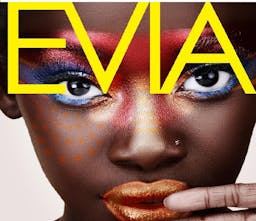FEMINISM IN NIGERIA: Why Feminism, why here, why now - Part 1
Jan 21, 2015
First story


Most people, men but interestingly enough, women, refer to feminists in third party - like a sect of a religion we don't understand, our magazine ran an issue on feminism which just about broached the subject... Here's One article I wrote... Read more at http://www.eviawoman.com/eviaMagazine.php
I now know that there are terrible misconceptions about feminism, that ‘f’ word, where most men and indeed women are concerned. They feel threatened by the very thought of women, pursuing what they believe to be a female only agenda. You might wonder whether or not we need feminism is Nigeria, it doesn’t appear at first that women are really discriminated against, we’re just following culture, right? Whatever happens is just the way it should be.
I know a lot of women in very high positions and at the peak of their careers; in happy marriages and single if they so choose. So will it be fair to say that we have it locked down and we need not bother pushing the feminist agenda any further, at least not exclusively? However, if you consider, the way in which rape, domestic violence and abuse against women in Nigeria goes unchecked, core traditions and limitations surrounding women in Nigerian homes and the downplaying of the effects of rampant infidelity to a woman’s psyche , you will at least give this most loathed word a chance to explain its ‘whys’.
Feminism is not and has never been a movement against men; women need men in whatever capacity just as much as men need women. So I think it is ignorant to believe that as a feminist you must hate men. What’s more sad for me is a lot of women’s interpretation of feminism as just that, which then means that if you are in love with your husband, choose to give up your career to raise your kids then you must not be feminist. Feminism was never a move to oppress men but to liberate women.
I believe that a lot of the ‘hard-line’ feminists that fought tooth and nail for equality and liberation are the reasons that we have such today, it is also true that there were most likely women whom in their homes were gentler in persuading their husbands to allow their daughters get an education, join the movement to allow women vote etc. Both methods have helped to advance the women’s liberation today and you and I are literate enough to read this article because of those decisions. We owe a lot of the liberties we enjoy to these women who held feminist ideals both publicly and in their homes. We must never forget that, the next time we’re tempted to refer to feminism as a ‘thing’ to which we owe neither allegiance nor empathy.
My Grandma was widowed at 38 with 8 children the last two being a set of twins barely a year old, long before it became fashionable in Nigeria to be a strong woman or iron-lady. She was not supported by her late husband’s family who laid claim to everything they shared and left her stranded – a practice very much ongoing in Nigeria. From her stories, I know too well all her struggles and all the businesses she embarked on, taking care of sick children and ensuring that they got a good education without ever re-marrying. What is interesting is that she never celebrates this as female power, or having one on the men, but rather as one that was able to, against all odds for women in her time, protect and provide for her family and still have enough love and substance in her spirit to be loving and protective towards her grandchildren, over 20 of us. Raising women like my grandmother is what I believe that feminism should be, and to a larger extent, is about.
Feminists are very often portrayed in two main negative lights, ‘angry & isolated women’ and/ or ‘men haters’. And as a result, many women who indeed are men lovers and just generally happy about life, never call themselves feminists.
Well I'm happily married, charming, humorous, sexually liberated, ambitious, friendly, stubborn and lovable and what’s more, I am a feminist and hold on sincerely and actively to feminist ideals. The more I get older, the more so I see the need to. I am neither bitter nor isolated and I do not hate men, but am I angry? You bet!
As I have got older, my anger has increased at what women in Nigeria have been through and how society fails to supports and protect women against domestic and sexual violence,. I am appalled at how a lot of our cultures celebrate ideologies that leave women exposed to discrimination and gender bias, depriving them of choices that they should be free to make and their entitlements in society. In some Nigerian cultures for instance, a woman is not entitled to inherit her father’s property and any sensible woman married into these tribes, must have at least one male child to be considered a blessing to her husband.
Whilst there’s absolutely nothing wrong with wanting male offspring, the fact that this is preferred to the other – often regarded as the lesser alternative - there-in lies the problem. I find shameful, people like a 40-year- old man I met who believes the birth of his son, was worthy of more celebration than that of his daughter two-years before, for the simple fact that ‘its a boy’. This angers me, because his daughter and many others in our society will inevitably grow up in an environment that negatively affects her worth as a human being. Although successful in her endeavours, his daughter will always feel like she is fighting men or she will cower under and imaginary idea that she’s a little less than a man.
These issues fuel my motivation to create awareness of equality and not necessarily similarity -What is good for a man is not what is good for a woman, not always. For instance, Women are left more susceptible to violence in the home, so laws against domestic violence become more of a female issue and high up on the feminist agenda.
These subtle untruths downplay, how important a woman’s work or presence is and create an illusion that what a woman faces, emotionally, physically and psychologically; especially when men are not likely to face the same issues, is just not that serious. In response to someone who asked why I don’t just encourage young men and women to believe in themselves, I say, ‘it isn’t the same thing’ they do not face the same battles and these issues are still not tackled sufficiently, not here in Nigeria. True acceptance and implementation of feminism liberates both men and women.
The head of diversity in a large corporation wrote an article about how women should get on in the work place, and in citing the fact that for the same job and pay, woman will be required to have more qualifications than a man. His advice? ...women should go ahead and get these qualifications so that they can be integrated into the work place. I don’t hold a grudge against his ignorance, truth is we have come some way because he’s pointed out a major issue– but from his response, we have miles to go, before we can begin to think about easing off the pedals.
It’s a slippery slope to be driven by anger but the truth is that anger is a sign of ample discontentment, and that’s what makes you think of change. If these issues didn’t affect me, I wouldn’t have a burden for them, and without the burden, we do little to help other women not as fortunate as us.
Its important to note your role in the next woman’s life.




